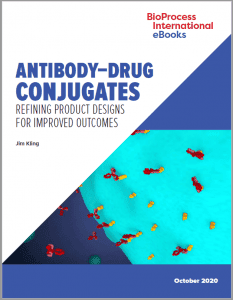eBook: Antibody–Drug Conjugates — Refining Product Designs for Improved OutcomeseBook: Antibody–Drug Conjugates — Refining Product Designs for Improved Outcomes
October 22, 2020
 Antibody–drug conjugates (ADCs) seek to partner the target specificity of antibodies with the cell-killing punch of chemotherapy drugs. Researchers identify antibodies that bind to proteins found predominantly or exclusively on the surfaces of cancer cells. The cells can absorb the ADC into their interiors, where the chemical environment or enzymes detach the drug from the antibody, freeing it to wreak havoc. Although nine ADCs have received US Food and Drug Administration (FDA) or European Medicines Agency (EMA) approval (and many more are in development), they have yet to become a universal success. Quite a few therapeutic programs have been abandoned because of dose-limiting toxicities — when side effects become too severe at doses high enough to control a tumor. To address such problems, researchers and companies are tweaking the drug payloads and chemical linkers that form the bridges between the therapeutic drugs and antibodies. Additionally, some researchers are beginning to use milder drugs in greater numbers to improve dosing flexibility. In this eBook, Jim Kling focuses on how such new approaches to ADC design may be altering the field’s trajectory.
Antibody–drug conjugates (ADCs) seek to partner the target specificity of antibodies with the cell-killing punch of chemotherapy drugs. Researchers identify antibodies that bind to proteins found predominantly or exclusively on the surfaces of cancer cells. The cells can absorb the ADC into their interiors, where the chemical environment or enzymes detach the drug from the antibody, freeing it to wreak havoc. Although nine ADCs have received US Food and Drug Administration (FDA) or European Medicines Agency (EMA) approval (and many more are in development), they have yet to become a universal success. Quite a few therapeutic programs have been abandoned because of dose-limiting toxicities — when side effects become too severe at doses high enough to control a tumor. To address such problems, researchers and companies are tweaking the drug payloads and chemical linkers that form the bridges between the therapeutic drugs and antibodies. Additionally, some researchers are beginning to use milder drugs in greater numbers to improve dosing flexibility. In this eBook, Jim Kling focuses on how such new approaches to ADC design may be altering the field’s trajectory.
Fill out the form below to read the complete eBook and learn more about antibody–drug conjugates now.
You May Also Like






